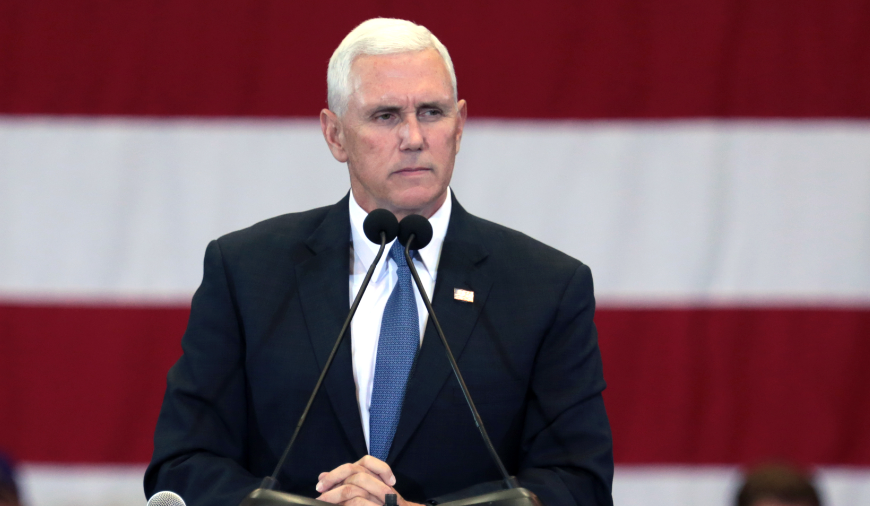Mike Pence Working to Shape a Post-Trump GOP: Report

Former Vice President Mike Pence is quietly maneuvering to build a Republican Party that pivots away from the influence of his former running mate, Donald Trump.
According to Semafor, Pence recently made a public statement distancing himself from “Trumpism.” He called on Republicans to move beyond “protectionist tariffs” and “isolationism” while “unashamedly” reasserting traditional conservative stances, particularly on anti-abortion issues.
Pence’s vision appears to be a future Republican Party that can move past Trump's populism and protectionist policies after the 2024 election. To this end, he has sometimes positioned himself as a rare voice of dissent while also working quietly to gather allies who might align with his conservative values on certain policies, Semafor reports, drawing on an op-ed Pence wrote for the Wall Street Journal.
“We’re trying to plant a flag for conservatism and believe that many of our traditional conservative groups have become far more enamored with populism these days and walked away from those principles,” said Marc Short, a longtime advisor to Pence, speaking to Semafor.
In his Wall Street Journal piece, Pence subtly critiques Trump's policy focus, offering a glimpse into his broader vision as he anticipates the results of the upcoming election. Semafor suggests that a central question lingers for Pence: Does he still hold a place within today’s GOP?
Even Pence’s backers aren’t sure. “He doesn’t fit into the Republican Party of today,” remarked Sen. Mitt Romney (R-Utah), who, like Pence, feels increasingly out of place in a party dominated by Trump. “The Republican Party of tomorrow may be a different matter,” Romney added.
Semafor further notes that, since Pence certified the 2020 election, drawing Trump’s ire, his platform of traditional conservatism hasn’t resonated strongly with GOP voters. Yet, despite his unsuccessful presidential bid, the former vice president and former governor remains worried about the direction of the party and has been working to rally others who share his concerns.
Pence faces a challenging path: he lacks the passionate fanbase that energizes other GOP leaders, a fact underscored during his presidential run. As Sen. Josh Hawley from Missouri put it, “If you run for president and lose, it’s hard to maintain influence.”
Trump allies have also criticized Pence for what they see as “disloyalty” to the former president. However, Pence retains close connections with many Capitol Hill lawmakers and activists across the country. Though he often operates behind the scenes, he is respected by a steadfast faction of the Republican Party.
With the support of his organization, Advancing American Freedom (AAF), Pence is working to position himself as the GOP’s “conscience,” according to Tim Chapman, AAF’s president. This approach is a source of optimism for those Republicans who, like Pence, feel sidelined by the party’s populist wave.
“There’s room for his voice and the voices of others for this reason: Our party is, at this point, mostly a political coalition in search of a clear policy agenda,” said Sen. Todd Young, a Republican from Pence’s home state of Indiana who has not endorsed Trump. “At some point, we’re going to have to gravitate around a clear policy agenda … And Mike Pence is very well equipped to do that.”
After a short-lived run for the 2024 Republican presidential nomination, Pence announced in July that he would not be supporting Trump, asserting that Trump’s policies no longer align with core conservative values.
“It should come as no surprise that I will not be endorsing Donald Trump this year. I’m incredibly proud of the record of our administration. It was a conservative record that made America more prosperous, more secure, and saw conservatives appointed to our courts in a more peaceful world,” Pence told Fox News.
Pence has also claimed that Trump has drifted from traditional conservative principles, particularly on issues like reducing the national debt and upholding the “sanctity of human life.”
Additionally, he expressed concern that Trump’s recent shift on China — including a lack of support for banning TikTok in the U.S. — contrasts with his previous stance against the Chinese-owned social media platform.